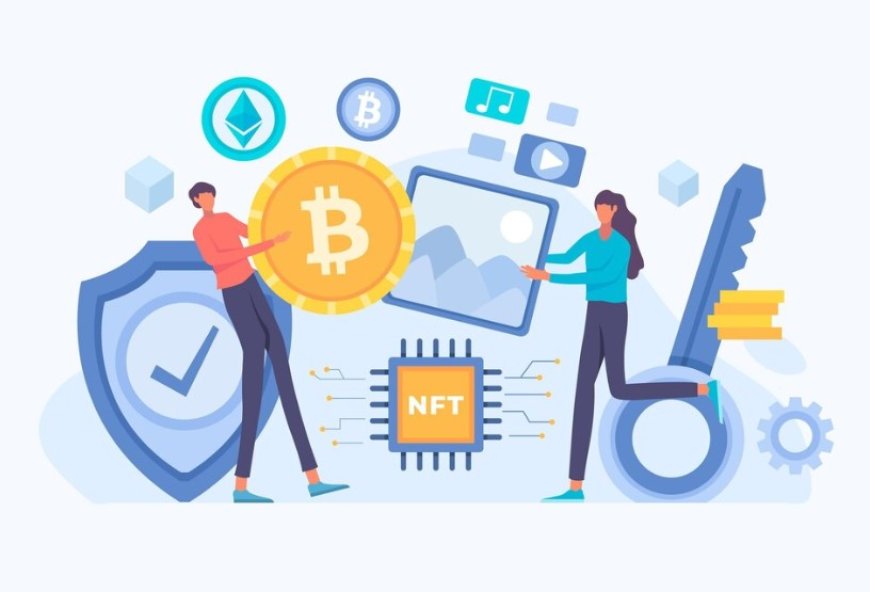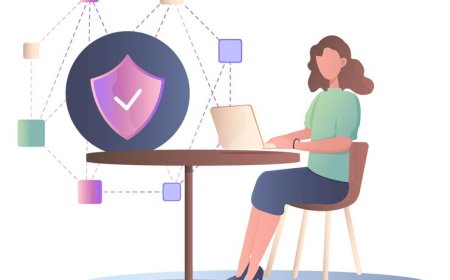Understanding Blockchain's Impact on Cybersecurity
Explore the significant impact of blockchain on cybersecurity. Discover real-world applications and future trends in this dynamic tech-security partnership.

Blockchain is like a high-tech, super-secure ledger. Imagine it as a digital notebook that keeps records of transactions, but it's not stored in one place; it's spread out all over the world. This makes it tough for bad actors to tamper with the information. It's like having a record-keeper that everyone trusts.
Now, let's chat about cybersecurity. In our online lives, we share personal info and sensitive data. Cybersecurity is like a protective shield that keeps this info safe from hackers and cyber threats. You can think of it as your digital bodyguard.
Why are these two things so important? Well, when you combine blockchain and cybersecurity, it's like having a super-shield for your data. Blockchain's decentralized and tamper-proof nature can beef up your digital security. So, understanding how these work together is crucial in our increasingly digital and interconnected world.
The complications and solutions when it comes to cybersecurity and blockchain.
Traditional cybersecurity faces some big challenges. Picture this: most of our data and systems are stored in central places, like big digital vaults. These centralized systems can be vulnerable. Hackers can target one spot and cause a lot of damage, like a thief breaking into a single, important safe.
But here's where blockchain comes to the rescue. It's like a digital guard that doesn't have a single headquarters. Instead, it's spread out everywhere, like a neighborhood watch. This means that if a hacker tries to mess with the data in one place, they'd have to deal with everyone in the neighborhood, making it super tough for them to succeed.
Blockchain also makes sure that once data is added, it can't be easily changed or deleted. It's like writing in pen instead of a pencil; it's permanent. So, even if a cyber intruder gets in, they can't easily cover their tracks.
Another neat thing is how blockchain can help with identity and access control. Imagine you have a digital fingerprint that proves it's really you when you access your online accounts. Blockchain can securely store and manage these digital fingerprints, making it much harder for someone to impersonate you.
Traditional cybersecurity has its challenges, especially with centralized systems. But blockchain is like a superhero sidekick, adding an extra layer of security. It spreads data everywhere, keeps it tamper-proof, and helps verify who you really are in the digital world.
What is the impact of blockchain on cybersecurity?
Tamper-Proof Protection: One significant impact of blockchain on cybersecurity is the creation of a tamper-proof environment. Traditional systems can be vulnerable to cyberattacks because they rely on centralized data storage. But with blockchain, data is stored across a vast network of computers. When information is added to the blockchain, it's recorded in a way that's nearly impossible to alter. It's like writing your name in wet cement; once it's there, it's there for good. This makes it incredibly challenging for hackers to manipulate or delete data.
Enhanced Data Privacy: Another key impact is the enhancement of data privacy. Blockchain is all about decentralization. Your data isn't stored in one central location, but across many computers in a network. This means your personal information isn't a sitting duck in one place, making it less attractive to cybercriminals. It's like having your valuables scattered across multiple safes; even if one is breached, the rest remain secure.
Identity Verification: Blockchain technology also plays a role in identity verification. In the digital world, proving your identity is essential for secure online transactions and interactions. Blockchain can securely store digital fingerprints or identity verification data, making it highly reliable. Think of it like having a digital passport that's tough to forge.
Access Control: Access control is crucial for cybersecurity. You want to make sure only authorized individuals can access certain information or systems. Blockchain's smart contracts allow for automated and highly secure access control. It's like having a digital gatekeeper that ensures only the right people get in.
Resilience to Attacks: The decentralized nature of blockchain makes it resilient to various types of attacks. Unlike centralized systems that have single points of failure, blockchain networks are distributed. Even if one part of the network is compromised, the rest remain intact. It's like playing a game of Jenga where you can remove a few blocks, but the tower still stands.
Transparency: Blockchain is known for its transparency. All transactions are recorded on a public ledger that anyone can access. While this may sound counterintuitive to privacy, it adds a layer of security by making all activities transparent and traceable. It's like having security cameras in a store; it deters bad behavior and helps identify culprits if something goes wrong.
Trust and Trustlessness: Blockchain creates trust through technology rather than relying on centralized authorities. Trust is established through the network's consensus mechanisms. This trustlessness can be a game-changer in environments where trust is hard to come by. It's like being able to trust a complete stranger in a business deal because you both follow the same unchangeable rules.
The impact of blockchain on cybersecurity is substantial. It offers solutions to many of the vulnerabilities in traditional systems. By providing tamper-proof protection, enhancing data privacy, improving identity verification and access control, and creating resilience to attacks, blockchain contributes significantly to a safer digital environment. Its transparency and trust-building capabilities further reinforce its importance in the cybersecurity landscape.
Can blockchain technology enhance cybersecurity measures effectively?
Think about it this way: when you want to keep your bike safe, you might use a sturdy lock. It's a bit like traditional cybersecurity. But what if you had a lock that not only kept your bike secure but also alerted the whole neighborhood if someone tried to steal it? That's where blockchain steps in, adding an extra layer of security to our digital lives.
So, how does it work? Traditional cybersecurity often relies on one central system, like a big vault with all your digital stuff inside. The trouble is, if a hacker gets past the guard, they can access everything. It's like breaking into one big safe.
Now, picture blockchain as a whole bunch of little safes scattered all over the place. When you use blockchain, your data isn't kept in just one spot—it's distributed across many computers in a network. If a hacker tries to mess with one of those little safes, everyone in the neighborhood (the network) knows about it. This makes it super tough for them to succeed.
Blockchain also has this amazing quality: once data is added to it, it's nearly impossible to change or delete. It's like writing in pen instead of a pencil; it's permanent. So, even if a cyber intruder manages to get into the data, they can't easily cover their tracks.
Now, back to the big question: Can blockchain enhance cybersecurity effectively? Well, it's like having a top-notch security system at home. It deters intruders and makes it challenging for them to break in. But, just like any security system, it's not foolproof.
Blockchain's decentralized and tamper-proof nature offers significant benefits. It can protect data from unauthorized access and tampering, making it a strong ally for cybersecurity. However, it's essential to understand that it's not a silver bullet that solves all problems.
Blockchain technology does come with its own set of challenges. For instance, it can be quite slow and resource-intensive. It may not be the best fit for all types of data or applications. Plus, while it makes data tamper-proof, it can't guarantee that the initial data entered is accurate or trustworthy. In other words, if you put false information into a blockchain, it will be securely recorded as false information.
So, while blockchain is a valuable addition to our cybersecurity toolkit, it's not the only tool we need. It works best when used alongside other security measures. The combination of traditional cybersecurity and blockchain technology can create a powerful defense against cyber threats.
explore how blockchain's impact on cybersecurity plays out in the real world.
Picture this: you're shopping online, and you want to be sure that your payment information is safe. This is where blockchain can step in. Many online retailers and financial institutions are using blockchain to enhance their cybersecurity. When you make a purchase, blockchain technology helps ensure that your payment information is encrypted and securely stored. This makes it extremely difficult for cybercriminals to intercept and misuse your data.
In the healthcare industry, the security of patient records and sensitive medical information is a top priority. Traditional systems have had their share of data breaches, which can be really concerning. But with blockchain, medical records can be stored in a highly secure and transparent way. This means that your medical history and personal information are protected from unauthorized access and tampering. It also enables healthcare providers to quickly and accurately access your medical records when needed, improving patient care.
Now, let's talk about supply chain management. In this world of global trade and logistics, keeping track of products as they move from manufacturer to consumer is a complex task. However, blockchain is transforming supply chain cybersecurity. By recording every step of a product's journey on a blockchain, companies can ensure the integrity of their goods. This not only reduces the risk of counterfeiting but also helps in identifying and addressing any issues or recalls more efficiently. It's like a digital seal of trust on the products you buy.
The financial sector is also embracing blockchain to fortify cybersecurity. When you send money internationally, you want to be certain that it reaches the right destination securely. Blockchain technology enables secure and near-instantaneous cross-border transactions. It eliminates the need for intermediaries and reduces the risk of fraudulent activities during the transfer. This not only saves time and money but also boosts the confidence of individuals and businesses in the financial system.
In government and public records, blockchain is helping to secure sensitive information. For instance, land registries are using blockchain to ensure the integrity of property records. When these records are stored on a blockchain, they become tamper-proof. This reduces the risk of property fraud and disputes, providing greater security to property owners.
Blockchain's impact on cybersecurity isn't limited to these examples. Various other industries and sectors are exploring its potential to enhance data security and protect against cyber threats.
Blockchain is like a trusty sidekick in the world of digital security. It's spreading data all around, making it tough for cyber bad guys to do harm. It also keeps records secure and ensures that your digital identity is well-protected. Looking ahead, the future of blockchain and cybersecurity is bright. We'll likely see more industries adopting this technology to keep our data safe. As technology advances, so will the ways blockchain can help us stay secure in our increasingly digital lives. So, stay tuned for more exciting developments in this dynamic duo of technology and security!




































